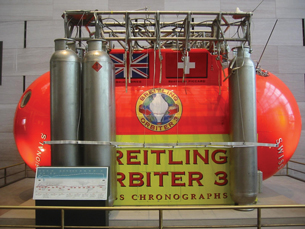Module 3 Intro
1. Module 3 Intro
1.14. Lesson 3 Intro
Module 3—Behaviour of Gases
Lesson 3—The Law of Combining Volumes and Avogadro’s Theory
 Get Focused
Get Focused

© Lyle J. Anderson. Used with permission
High-altitude ballooning creates many unique situations that must be considered. One aspect is the quantity of available oxygen. Oxygen is necessary for the crew to survive, and at high altitudes in the atmosphere, oxygen is less plentiful. You may recall that hot air within the balloon is necessary for lift. The air inside the balloon is heated by a combustion reaction. How is this possible in the upper atmosphere with limited oxygen?
You may notice the large compressed gas cylinders along the side of the Breitling Orbiter 3, the first hot-air balloon to circle Earth without stopping. The gases in the Breitling orbiter balloon were heated using a combustion reaction involving propane and oxygen. When planning the flight, the balloonists needed to know how many canisters of each gas, propane and oxygen, to carry. How would knowledge of gas laws assist their efforts?
Essential Question
- Is it possible to predict the quantity of a gaseous substance involved in a chemical reaction?
 Assessment
Assessment
There is no Module 3: Lesson 3 Assignment.
You must decide what to do with the questions that are not marked by the teacher.
Remember that these questions provide you with the practice and feedback that you need to successfully complete this course. You should respond to all the questions and place those answers in your course folder.